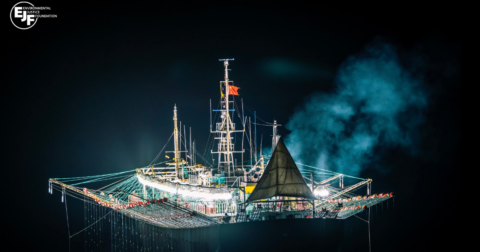News
A Major Agreement to Protect the Amazon Is Falling Apart After 20 Years
Climate•6 min read
News
Most buyers sourcing squid from vessels accused of crew abuse and deaths are based in North America — nearly half in the U.S. and one-third in Canada.


Words by Gaea Cabico
The calamari served in restaurants in the United States may have a more troubling backstory than diners realize. Some of it comes from ships, mostly Chinese, that engage in human rights violations and ecologically destructive fishing off the coast of Argentina.
This unregulated industry exploits workers and threatens to deplete marine life in the area, according to a report by the London-based nonprofit Environmental Justice Foundation released last month. The report highlights the seafood supply chains linking these fleets to 142 buyers and importers in the U.S. and Canada.
Crew members on these vessels endure a litany of physical abuse, deception and coercion. An Indonesian worker reportedly died from untreated appendicitis after his request to return home was denied. A worker on another Chinese vessel told the Environmental Justice Foundation that he was beaten by senior officers for making a mistake, but he could not understand their instructions in Chinese. Overall, nearly two-thirds of Chinese squid vessels identified in the report were linked to physical abuse or deaths on board.
Consumers of these squid in the U.S. are “eating a product that may have been caught by somebody in force, bonded or slave labor,” Steve Trent, CEO and founder of the Environmental Justice Foundation, tells Sentient.
Of the 187 buyers and importers that purchased from squid jigging vessels implicated in crew abuses and deaths, 44% are based in the United States, 32% in Canada and 13% in the European Union, according to the new report. Purchasing records were retrieved from the trade data platform TradeDataPro and from the Outlaw Ocean Bait-to-Plate database. The report does not publicly identify the companies involved.
Rising market demand for squid across the globe is driving the problem. Nations that import squid should have strong controls to ensure that it is caught legally, ethically and sustainably, Trent says. Countries that buy squid are “not playing their part” in enforcing those standards, he adds.
One example of robust enforcement occurred when the U.S. Customs and Border Protection (CBP) identified signs of forced labor on the fishing vessel Zhen Fa 7, which was flying the Chinese flag. The agency issued an order declaring that it will confiscate squid and other seafood from the vessel at all U.S. ports of entry. “CBP identified the following International Labor Organization forced labor indicators within Zhen Fa 7’s operations: abuse of vulnerability, isolation, retention of identity documents, abusive working and living conditions, physical and sexual violence, and debt bondage,” the agency said in a release.
The Environmental Justice Foundation’s investigation focused on the Argentine shortfin squid fishery in the southwest Atlantic in an area known as Mile 201 — a high seas zone just beyond Argentina’s territorial waters with no regulatory oversight. The organization analyzed fisheries data and vessel activity, conducted an ocean expedition with the Argentine Coast Guard, and interviewed scientists, coast guard personnel, and crew members who had worked on squid vessels.
Analysis of Automatic Identification System data from Global Fishing Watch found that an average of 343 squid jigging vessels operated there each year between 2019 and 2024. Because some vessels turn off their Automatic Identification System signals to conceal their location for illicit activities, the actual number of ships is likely higher. Three-quarters of these vessels are flagged to China, the world’s leading squid-fishing nation. Meanwhile, ships from Taiwan and South Korea make up 18% and 7% of the fleet, respectively.
Fishers use large, bright lights to bring squid to the surface at night and capture them using jigs or multi-hook lines. According to the new report, fishing effort in Mile 201 increased by 65% between 2019 and 2024, mostly due to Chinese vessels, which ramped up their effort by 85%. During this time period catches declined, suggesting the population of Argentine shortfin squid is under severe stress.
This unregulated fishing takes a heavy toll on people who work on these vessels, many of whom are from Indonesia and the Philippines.

Officers on fishing vessels often subject workers to physical violence, intimidation and fraud. Most of the crew members interviewed by the Environmental Justice Foundation reported being trapped in debt bondage, with substantial recruitment fees and debts forcing them to work for minimal pay. Many recounted shifts exceeding 14 hours, poor food, degrading living conditions, and senior officers confiscating their passports. One crew member recalled that when squid are plentiful, “we don’t sleep for three days and three nights.” Some were deceived: their wages were lower than what was stated in their contracts and they were assigned to vessels different from those promised, leaving them in exploitative working conditions. One worker recounted that they could not communicate with their family for an entire year while at sea.
Some reported being punched, kicked, or slapped by senior officers for being inexperienced, late, sick or making mistakes while sorting the catch. For instance, a crew member on a South Korean jigger recounted that the captain kicked him until his rib broke, and none of the other officers intervened. “I thought I would die that day,” he told the Environmental Justice Foundation.
Five crew members died on four Chinese vessels, according to the Environmental Justice Foundation’s interviews with fellow crew members. On one vessel, a Filipino crew member fell ill. His repeated requests to go home were ignored. After he died, his body was kept in the freezer and then thrown overboard. In another instance, a crew member died after being forced to work while sick without proper medical care.
“Because it’s at sea and because of the nature of fisheries governance, the failure to deliver transparency on the boats and in the supply chains, this continues with impunity,” Trent says.
Migrant fishers from Indonesia and the Philippines, often from rural and low-income communities, are recruited through private firms that place workers on foreign fishing vessels under the promise of better jobs. Some of these companies have sent fishers to exploitative companies that overwork and underpay their crews. Reporting by the journalism nonprofit The Outlaw Ocean Project found that the Philippines’ Department of Migrant Workers has repeatedly failed to protect migrant Filipino workers, allowing problematic agencies to keep operating despite clear evidence of abuse.
“It’s still very difficult for many people in the government, particularly in the Department of Migrant Workers, to see the legal migration of men into fishing vessels as a human trafficking issue,” Sallie Yea, a lecturer at Charles Sturt University in Australia who researches seafood labor trafficking, tells Sentient. Even if their migration is legal, it meets the criteria for human trafficking because the men are kept on the ships using force, fraud or coercion. She adds that even when cases meet all the indicators of trafficking, they are still mostly treated as labor issues, and the labor rights framework in the Philippines remains underdeveloped.
Beyond the human toll, relentless overfishing could threaten the Argentine shortfin squid population, the Environmental Justice Foundation warns.
Argentine shortfin squid have a life cycle of about one year. During that brief life, they grow quickly, reproduce once, and then die. The International Union for Conservation of Nature classifies the species as “least concern” but notes it is “fished at, or possibly above, its maximum sustainable level.” Seafood Watch, a sustainable seafood advisory list by Monterey Bay Aquarium in California, rates it “red” — meaning consumers should avoid it — due to unregulated fishing, stock concerns, and inadequate management.
Argentine shortfin squid are a keystone species, playing a critical role in Southwest Atlantic ecosystems. They serve as a key food source for dolphins, seals, whales, seabirds and commercially important fish like hake and tuna.
So far, their populations have withstood heavy fishing thanks to favorable environmental conditions that have helped them rebound, the Environmental Justice Foundation says. But overfishing combined with poor environmental conditions for squid reproduction could trigger a population collapse, with climate change amplifying all of these threats, the Environmental Justice Foundation says.

The report also details harm to other marine life. Officers and crew members on Chinese and Taiwanese vessels deliberately harpooned and slaughtered seals for their teeth, tusks and fur, which are used for ornamental purposes, with the rest of their bodies discarded at sea. Some vessels also engaged in shark finning, or the practice of cutting off a shark’s fins, often while it is still alive, and leaving mutilated bodies in the water. Shark fins are in high demand for traditional Chinese medicine and shark fin soup. Shark finning is illegal in Canada, Taiwan, the United States and the European Union.
Despite evidence of resource exploitation and crew abuse, Chinese authorities have denied or ignored findings and taken no meaningful action, while Taiwan has shown willingness to engage and improve transparency, says Trent. “It is almost inconceivable now that the authorities in Beijing don’t know about this,” he says.
To better manage the Argentine shortfin squid fishery, the Environmental Justice Foundation urged governments to adopt the Global Charter for Fisheries Transparency, which would make vessel information and fishing activity publicly accessible, helping governments to spot and prevent unregulated fishing and human rights abuses at sea.
The Environmental Justice Foundation also recommends that countries importing squid from the southwest Atlantic strengthen checks on seafood from poorly regulated high-seas fisheries through verification, audits, and investigations and prohibit imports linked to labor abuses.
These measures are already technologically feasible and can be implemented with minimal effort, Trent points out. “There’s a whole narrative that’s built around it that says, ‘It’s hard. It’s difficult. It can’t be done.’ That’s not actually functionally true,” he says. “If you build transparency, if you have simple controls at borders and at points of export, you can change it.”
While programs to protect migrant fishers are important, most men take these jobs out of necessity. “Why are men getting into this work in the first place? It’s really the last of several bad options for them,” Yea says. Addressing the factors that push these men into risky fishing — including their personal circumstances, lack of jobs in their communities, and the effects of climate disasters on their homes — is equally crucial, Yea emphasizes. “I’ve never actually met a guy who wants to do this work,” she says.